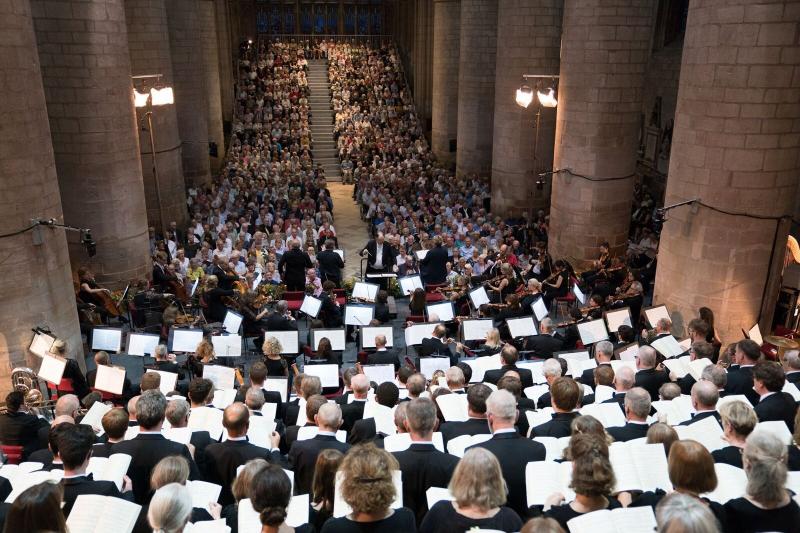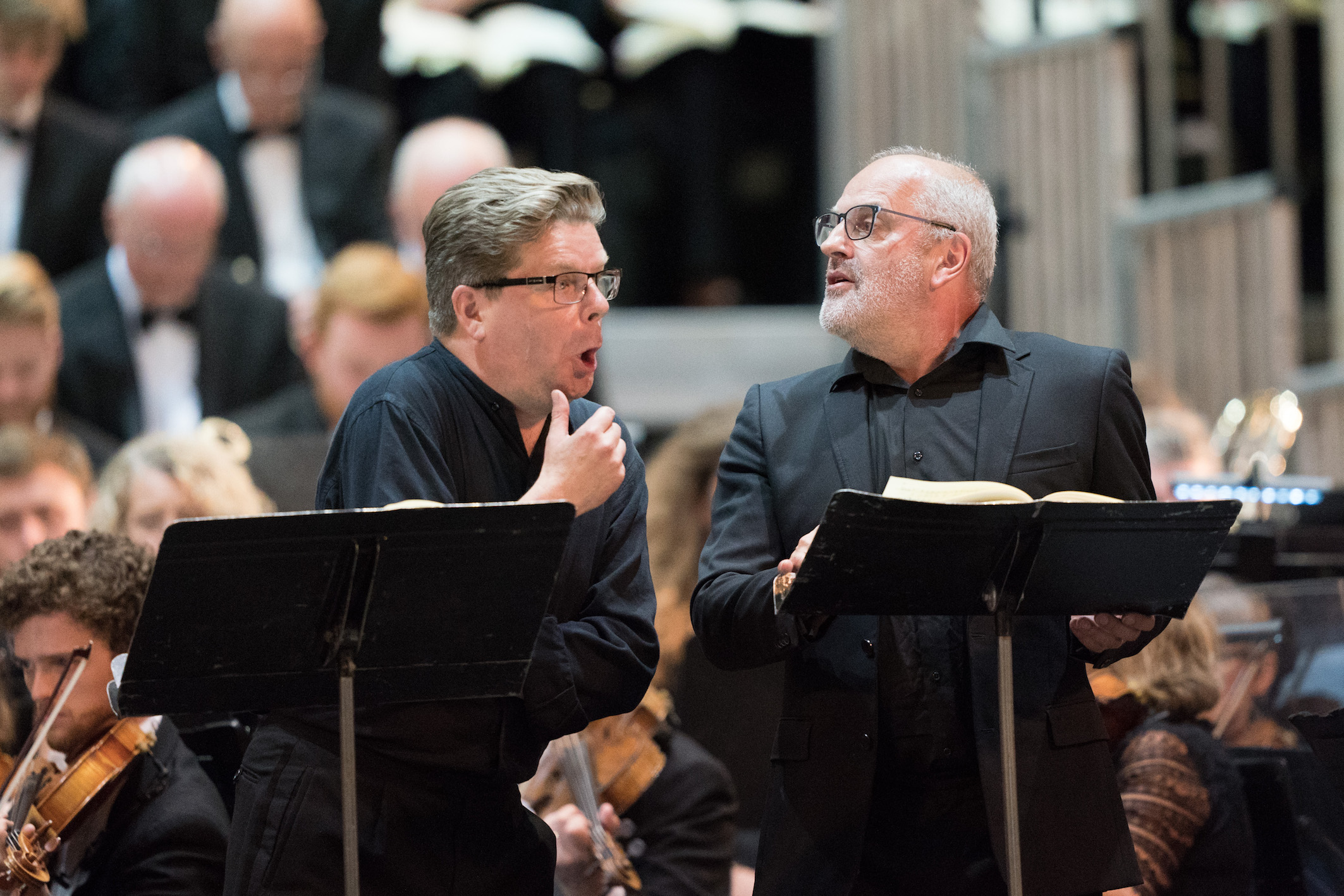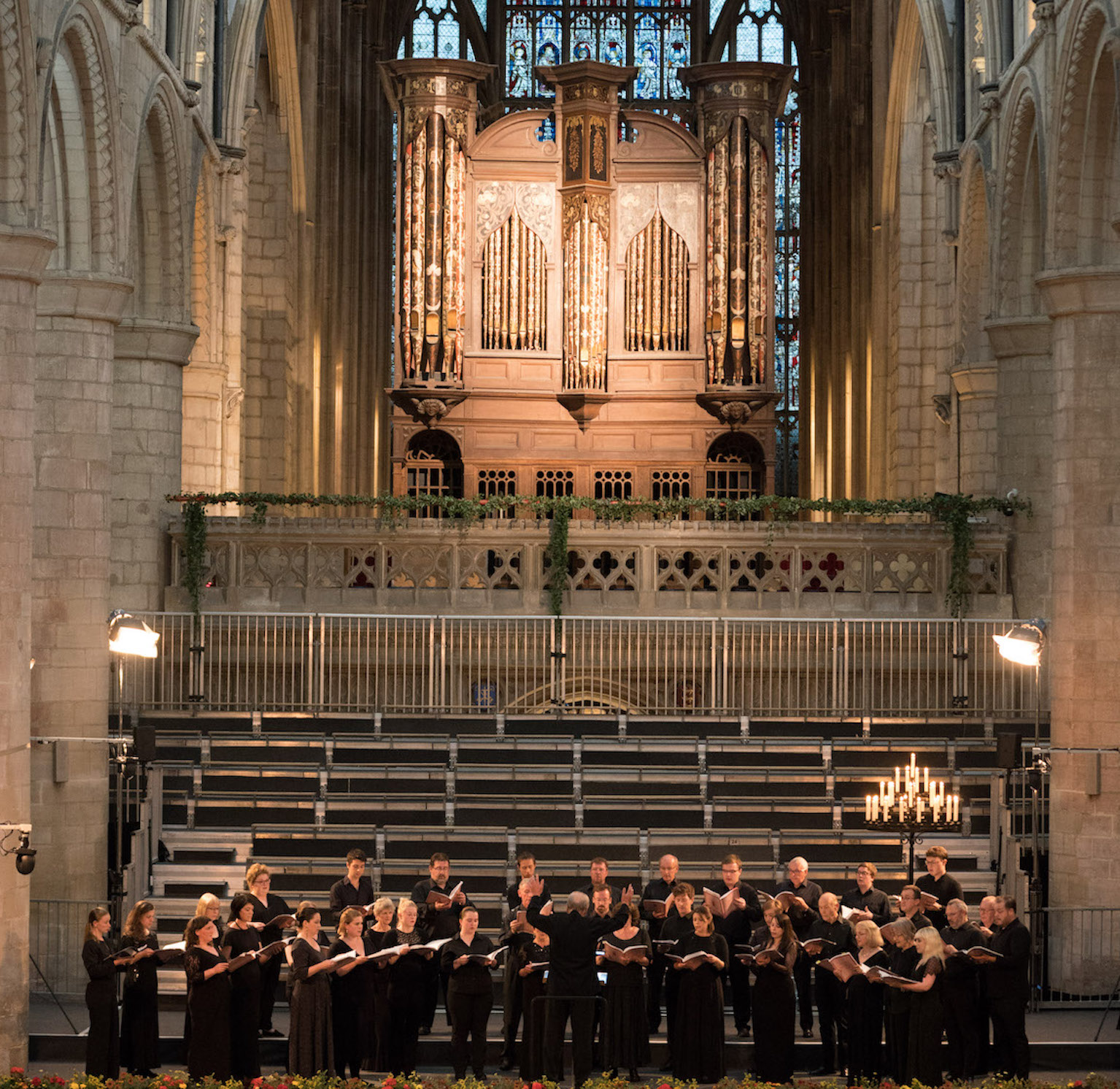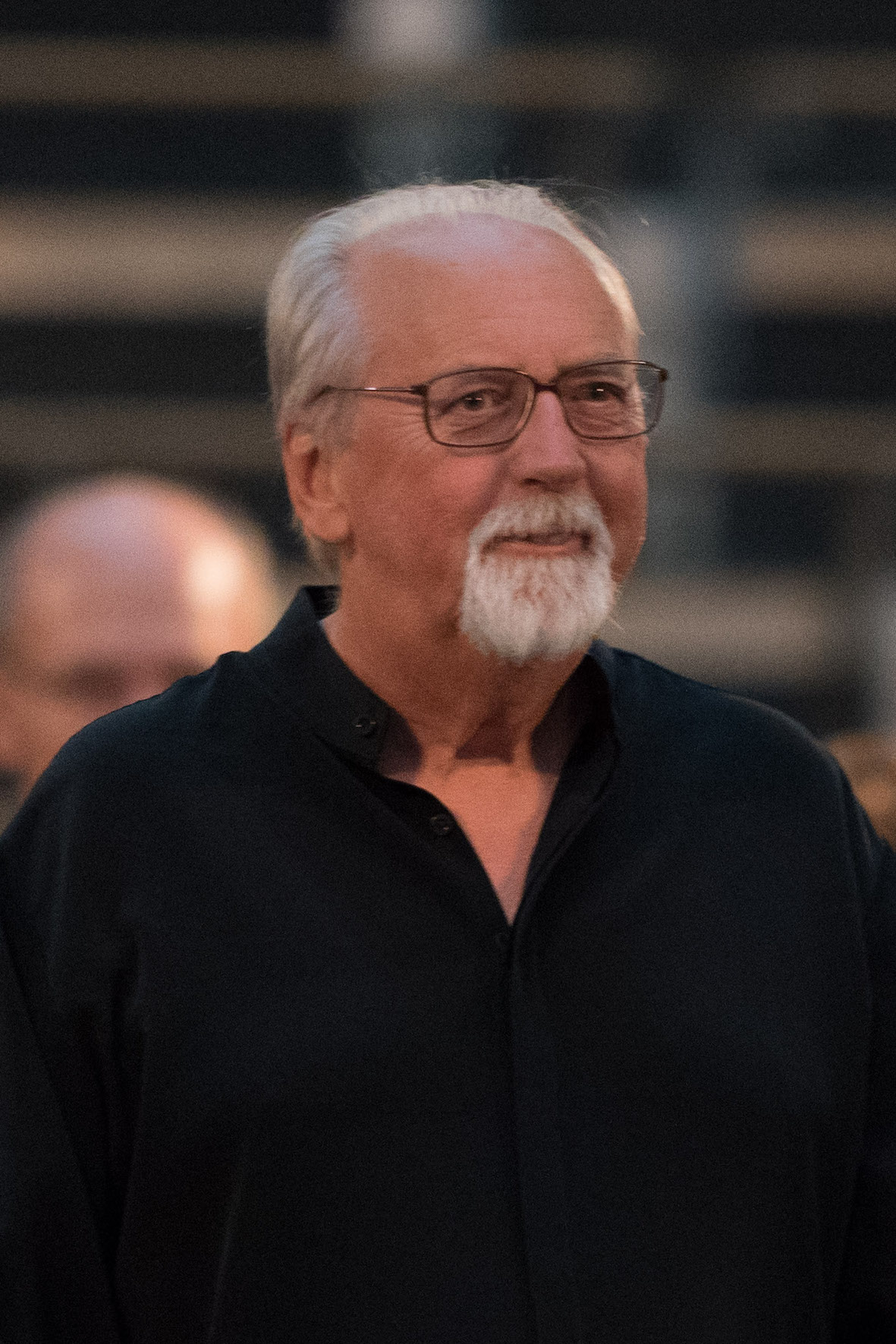theartsdesk at the Three Choirs Festival - the beautiful and the damned | reviews, news & interviews
theartsdesk at the Three Choirs Festival - the beautiful and the damned
theartsdesk at the Three Choirs Festival - the beautiful and the damned
Berlioz's thrilling theatre of the mind and Rachmaninov in rich Russian Orthodox mode

Our greatest Berlioz scholar, David Cairns, has called Le Damnation de Faust “an opera of the mind’s eye, not of the stage,” and I’ve certainly never seen a production that successfully staged its curious, episodic, actionless mixture of set piece, romantic brooding, and flickering cinematic imagery.
One might say QED. In fact La Damnation is one of Berlioz’s most (one could risk saying few) perfectly designed scores; and as the superb concert performance that opened this year’s Three Choirs Festival in Gloucester Cathedral showed, it neither needs nor wants the attentions of a theatre director in order to make its full dramatic impact.
Admittedly Gloucester’s great Norman nave provided a brilliantly apt, ironic theatre, if not the most ideal acoustics, for the peculiar, un-Goethean eschatology of Berlioz’s ending, which has poor Faust damned rather than saved - and damned, I’m bound to add, in music as diabolically thrilling as anything in Bosch or Brueghel.

For the chorus, this music is way beyond the complexity of even The Dream of Gerontius (which has a few modest demons of its own), not to mention the Messiah. But under Adrian Partington’s super-secure direction, the Festival Chorus seemed completely on top of things and to be frankly loving their unaccustomed roles as soldiers, drunken students, gnomes, sylphs, will o’the wisps, and assorted demons and damned souls - just the thing to prepare for choral evensong. Inevitably, some of Berlioz’s detailing vanished into the high vaults; but the excitement and engagement, the surreal sense of unstoppable motion, the world dashing by like an endlessly scrolling backcloth - all this was caught with rare precision. In the packed cathedral, nobody stirred; the concentration was electric.
Partington is to my mind an under-sung conductor. He has a great knack for bringing together complicated choral works in by no means easy surroundings with partly amateur performers and without conductorly ostentation. But he also does well by the professionals. The Philharmonia Orchestra played (as they always play) supremely well for him: and what marvellously unaccustomed things Berlioz gives them to do!
But La Damnation is particularly tough on Faust (never mind his eventual fate). He is there, singing, from bar eight onwards, exposed, high-lying music. Apart from a few tremors in the upper regions, Peter Hoare (pictured above with Christopher Purves) sustained his role beautifully, strong especially in the lyrical flights that are the work’s hallmark and that come from Berlioz’s refusal to set the French language as if it were German. Hoare’s own French was solid; only his hand gestures were somewhat distracting, as if pulling the music out of his mouth.
 He was greatly helped, I suggest, by having Christopher Purves - recently also Glyndebourne’s Mephistopheles - alongside him, providing minimal but pinpoint Satanic gestures to help avoid the po-faced oratorianism that still sometimes afflicts Three Choirs performances, and singing with magnificent villainy and self-assurance. An unstaged performance - Deo gracias - but by no means an undramatic one. A kind of visionary calm was supplied by Susan Bickley’s Marguerite, angelically still and pure of tone in “Le roi de Thulé,” tragically intense in “D’amour l’ardente flamme”, and lovingly accompanied by viola and cor anglais respectively. As a bonne bouche, David Ireland sang Brander’s rat song with suitably dry eloquence.
He was greatly helped, I suggest, by having Christopher Purves - recently also Glyndebourne’s Mephistopheles - alongside him, providing minimal but pinpoint Satanic gestures to help avoid the po-faced oratorianism that still sometimes afflicts Three Choirs performances, and singing with magnificent villainy and self-assurance. An unstaged performance - Deo gracias - but by no means an undramatic one. A kind of visionary calm was supplied by Susan Bickley’s Marguerite, angelically still and pure of tone in “Le roi de Thulé,” tragically intense in “D’amour l’ardente flamme”, and lovingly accompanied by viola and cor anglais respectively. As a bonne bouche, David Ireland sang Brander’s rat song with suitably dry eloquence.
Those seeking redemption after this did well to book in for Rachmaninov’s All Night Vigil (wrongly billed as Vespers) in the cathedral two days later, stylishly sung by Ex Cathedra (pictured above), in their fiftieth anniversary year and under their founding conductor Jeffrey Skidmore.
 While the world lapped up the swooning romanticism of Rachmaninov’s concert music, he himself regarded the Vigil as his best work, perhaps because it connected him in his own mind, after the 1917 Revolutions, with the Russia he’d lost. More interestingly, it clarifies, even explains, the swooning concert music, much of which (once the penny has dropped) is audibly derived precisely from the Orthodox chant recreated in the Vigil. Think of the first theme of the Second Piano Concerto, for instance, take away the four-square rhythm, and you have something you might well hear in some remote chapel of the Nikolsky Sobor or the Preobrazhensky in St. Petersburg.
While the world lapped up the swooning romanticism of Rachmaninov’s concert music, he himself regarded the Vigil as his best work, perhaps because it connected him in his own mind, after the 1917 Revolutions, with the Russia he’d lost. More interestingly, it clarifies, even explains, the swooning concert music, much of which (once the penny has dropped) is audibly derived precisely from the Orthodox chant recreated in the Vigil. Think of the first theme of the Second Piano Concerto, for instance, take away the four-square rhythm, and you have something you might well hear in some remote chapel of the Nikolsky Sobor or the Preobrazhensky in St. Petersburg.
Skidmore (pictured left) drew from his singers all the right sounds, including occasionally mistuned intonings, 32-foot stop basses, and tenors who might at a pinch step onstage and sing Lensky’s aria or the Simpleton’s song in Boris Godunov. Rachmaninov’s more complex writing seemed to hold no terrors for these singers. But their most beautiful moments were the simplest: the Nunc dimittis and the “Blazhen muzh” (“Blessed is the Man”), where they captured that rich, sonorous blend that makes the best Russian choirs sound like a perfectly coordinated wind ensemble. Gloucester Cathedral has a first-rate choir of its own. But this was definitely not their kind of noise.
rating
Share this article
The future of Arts Journalism
You can stop theartsdesk.com closing!
We urgently need financing to survive. Our fundraising drive has thus far raised £49,000 but we need to reach £100,000 or we will be forced to close. Please contribute here: https://gofund.me/c3f6033d
And if you can forward this information to anyone who might assist, we’d be grateful.

Subscribe to theartsdesk.com
Thank you for continuing to read our work on theartsdesk.com. For unlimited access to every article in its entirety, including our archive of more than 15,000 pieces, we're asking for £5 per month or £40 per year. We feel it's a very good deal, and hope you do too.
To take a subscription now simply click here.
And if you're looking for that extra gift for a friend or family member, why not treat them to a theartsdesk.com gift subscription?
more Classical music
 Scottish Chamber Orchestra, Ibragimova, Queen’s Hall, Edinburgh review - rarities, novelties and drumrolls
A pity the SCO didn't pick a better showcase for a shining guest artist
Scottish Chamber Orchestra, Ibragimova, Queen’s Hall, Edinburgh review - rarities, novelties and drumrolls
A pity the SCO didn't pick a better showcase for a shining guest artist
 Kilsby, Parkes, Sinfonia of London, Wilson, Barbican review - string things zing and sing in expert hands
British masterpieces for strings plus other-worldly tenor and horn - and a muscular rarity
Kilsby, Parkes, Sinfonia of London, Wilson, Barbican review - string things zing and sing in expert hands
British masterpieces for strings plus other-worldly tenor and horn - and a muscular rarity
 From Historical to Hip-Hop, Classically Black Music Festival, Kings Place review - a cluster of impressive stars for the future
From quasi-Mozartian elegance to the gritty humour of a kitchen inspection
From Historical to Hip-Hop, Classically Black Music Festival, Kings Place review - a cluster of impressive stars for the future
From quasi-Mozartian elegance to the gritty humour of a kitchen inspection
 Shibe, LSO, Adès, Barbican review - gaudy and glorious new music alongside serene Sibelius
Adès’s passion makes persuasive case for the music he loves, both new and old
Shibe, LSO, Adès, Barbican review - gaudy and glorious new music alongside serene Sibelius
Adès’s passion makes persuasive case for the music he loves, both new and old
 Anja Mittermüller, Richard Fu, Wigmore Hall review - a glorious hall debut
The Austrian mezzo shines - at the age of 22
Anja Mittermüller, Richard Fu, Wigmore Hall review - a glorious hall debut
The Austrian mezzo shines - at the age of 22
 First Person: clarinettist Oliver Pashley on the new horizons of The Hermes Experiment's latest album
Compositions by members of this unusual quartet feature for the first time
First Person: clarinettist Oliver Pashley on the new horizons of The Hermes Experiment's latest album
Compositions by members of this unusual quartet feature for the first time
 Gesualdo Passione, Les Arts Florissants, Amala Dior Company, Barbican review - inspired collaboration excavates the music's humanity
At times it was like watching an anarchic religious procession
Gesualdo Passione, Les Arts Florissants, Amala Dior Company, Barbican review - inspired collaboration excavates the music's humanity
At times it was like watching an anarchic religious procession
 Classical CDs: Camels, concrete and cabaret
An influential American composer's 90th birthday box, plus British piano concertos and a father-and-son duo
Classical CDs: Camels, concrete and cabaret
An influential American composer's 90th birthday box, plus British piano concertos and a father-and-son duo
 Cockerham, Manchester Camerata, Sheen, Martin Harris Centre, Manchester review - re-enacting the dawn of modernism
Two UK premieres added to three miniatures from a seminal event of January 1914
Cockerham, Manchester Camerata, Sheen, Martin Harris Centre, Manchester review - re-enacting the dawn of modernism
Two UK premieres added to three miniatures from a seminal event of January 1914
 Kempf, Brno Philharmonic, Davies, Bridgewater Hall, Manchester review - European tradition meets American jazz
Bouncing Czechs enjoy their Gershwin and Brubeck alongside Janáček and Dvořák
Kempf, Brno Philharmonic, Davies, Bridgewater Hall, Manchester review - European tradition meets American jazz
Bouncing Czechs enjoy their Gershwin and Brubeck alongside Janáček and Dvořák
 Solomon, OAE, Butt, QEH review - daft Biblical whitewashing with great choruses
Even a top soprano and mezzo can’t make this Handel paean wholly convincing
Solomon, OAE, Butt, QEH review - daft Biblical whitewashing with great choruses
Even a top soprano and mezzo can’t make this Handel paean wholly convincing
 Two-Piano Gala, Kings Place review - shining constellations
London Piano Festival curators and illustrious friends entertain and enlighten
Two-Piano Gala, Kings Place review - shining constellations
London Piano Festival curators and illustrious friends entertain and enlighten

Add comment